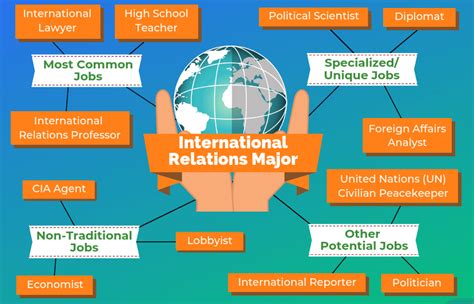International Relations Degree: 15 Career Paths

Are you interested in global affairs, diplomacy, and fostering positive international relationships? If so, pursuing a degree in International Relations can open up a world of exciting career opportunities. From working in government agencies to international organizations, there are numerous paths you can take with an International Relations degree. In this article, we will explore 15 career paths that you can pursue with this degree.
1. Diplomat
As a diplomat, you will represent your country’s interests abroad. This may involve negotiating treaties, resolving conflicts, and promoting trade and cultural exchange. Diplomats often work in embassies or consulates, and they play a crucial role in maintaining international relations.
2. Foreign Service Officer
Foreign service officers work for their country’s foreign affairs department and are responsible for implementing foreign policy initiatives. They may work in various capacities, such as political, economic, or cultural officers, and they often serve in embassies or consulates around the world.
3. International Development Specialist
International development specialists work to address global poverty and inequality. They may work for government agencies, non-profit organizations, or international development banks. Their work often involves designing and implementing projects to improve living conditions in developing countries.
4. International Trade Specialist
International trade specialists help facilitate trade between countries. They may work for government agencies, trade associations, or consulting firms. Their responsibilities include analyzing trade policies, negotiating trade agreements, and promoting exports and imports.
5. Political Analyst
Political analysts study political systems, policies, and trends in different countries. They often work for research institutions, think tanks, or government agencies. Their analysis and insights help inform policymakers and shape international relations strategies.
6. Intelligence Analyst
Intelligence analysts gather and analyze information to help governments and organizations make informed decisions. They work in intelligence agencies or security organizations and contribute to national security and foreign policy objectives.
7. International Human Rights Advocate
International human rights advocates work to promote and protect human rights globally. They may work for non-governmental organizations (NGOs), international organizations, or government agencies. Their work involves raising awareness, conducting research, and advocating for policy changes.
8. Conflict Resolution Specialist
Conflict resolution specialists help resolve conflicts and disputes between individuals, groups, or countries. They may work for government agencies, non-profit organizations, or international organizations. Their work includes mediation, negotiation, and facilitating dialogue to find peaceful resolutions.
9. International Journalist
International journalists report on global events and issues. They work for news outlets, including newspapers, magazines, or broadcast networks. International journalists play a crucial role in informing the public about international relations and promoting understanding between countries.
10. International Business Consultant
International business consultants provide guidance to companies seeking to expand their operations globally. They help navigate cultural, legal, and economic differences in different countries. Their expertise is essential for companies aiming to enter foreign markets.
11. Non-profit Program Manager
Non-profit program managers oversee the implementation of programs and initiatives for non-profit organizations operating internationally. They work to address social, environmental, or humanitarian issues. Non-profit program managers ensure that programs are effective and aligned with the organization’s mission.
12. International Education Administrator
International education administrators work in universities, colleges, or educational institutions with international programs. They manage study abroad programs, international student services, and partnerships with foreign universities. Their role is crucial in promoting cross-cultural understanding and educational exchange.
13. International Law Specialist
International law specialists work on legal issues that involve multiple countries. They may work for law firms, international organizations, or government agencies. International law specialists play a vital role in ensuring compliance with international treaties and laws.
14. Global Public Health Specialist
Global public health specialists work to address health issues on a global scale. They may work for government agencies, non-profit organizations, or international health organizations. Their work involves disease prevention, healthcare policy, and improving access to healthcare.
15. Policy Analyst
Policy analysts work in government agencies, think tanks, or research institutions to analyze and develop policies. They provide recommendations based on research and data analysis. Policy analysts play a crucial role in shaping international relations and informing decision-makers.
Conclusion
An International Relations degree can open up a wide range of exciting career paths. Whether you are interested in diplomacy, international development, or global health, there is a career option that aligns with your interests. The field of International Relations offers opportunities to make a positive impact on global affairs and contribute to a more peaceful and interconnected world.
Frequently Asked Questions
- What skills are important for a career in International Relations?
- What are the job prospects for International Relations graduates?
- Is it necessary to pursue a master’s degree in International Relations?
- Can I specialize in a specific region or topic within International Relations?
- Is international travel a requirement for careers in International Relations?
Strong communication, analytical thinking, and cross-cultural skills are essential for a career in International Relations. Additionally, language proficiency and a deep understanding of global politics are highly valued.
Job prospects for International Relations graduates are diverse. Graduates can find employment in government agencies, non-profit organizations, international organizations, consulting firms, and more.
While a master’s degree can enhance career prospects and provide in-depth knowledge, it is not always necessary. Many entry-level positions in the field only require a bachelor’s degree.
Yes, many International Relations programs offer specializations in areas such as Middle East studies, global health, or international law. Specializing can provide a deeper understanding and expertise in a specific area.
While international travel is often a part of careers in International Relations, it is not always a requirement. Many positions can be based in home countries and involve working with international partners remotely.
